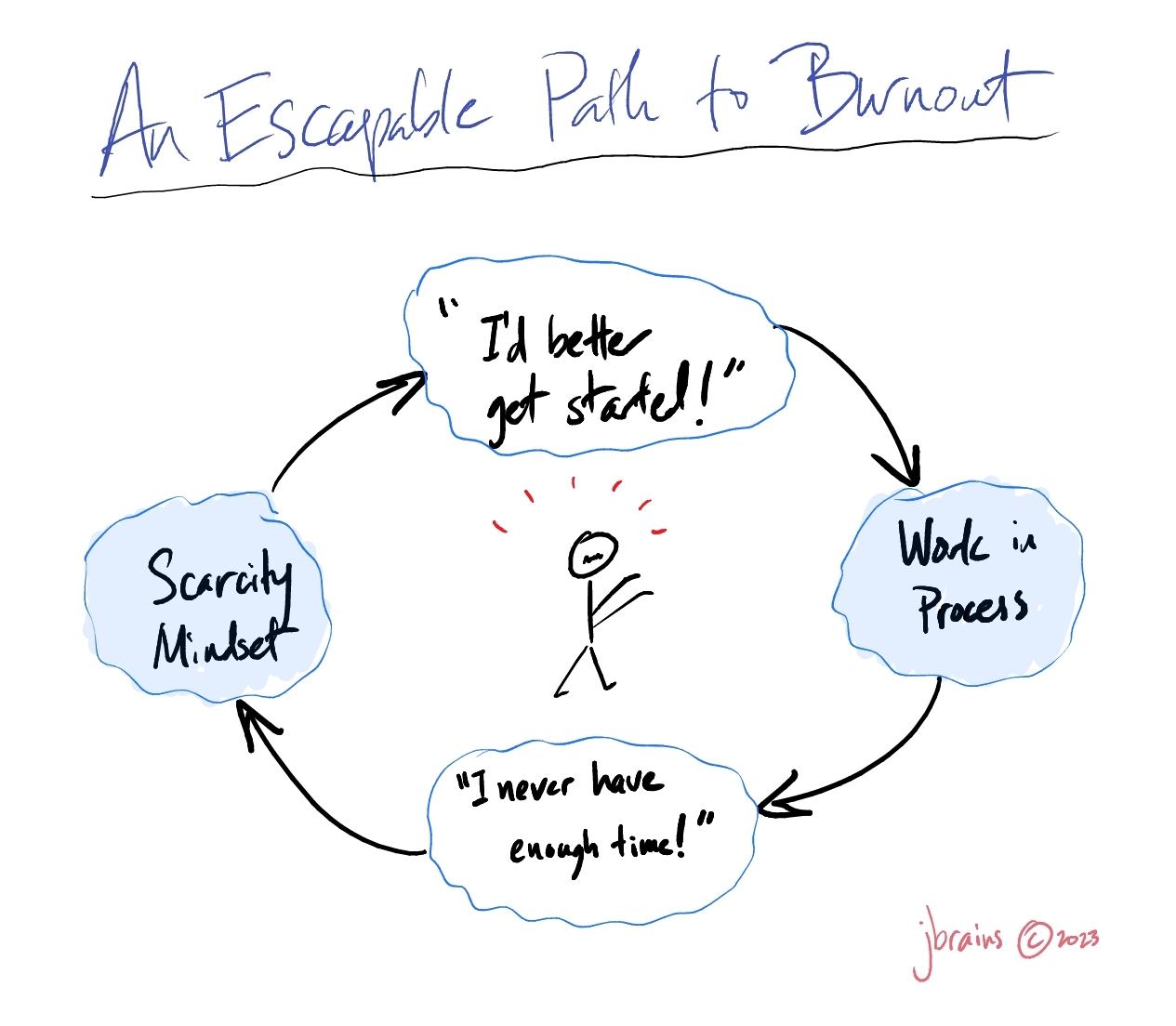Scarcity Mindset and Work In Process
Summary
One very common trap that software professionals become stuck in: the positive feedback loop between feeling stressed for time and trying to do everything. Burnout follows for those who don’t find a way to break free of this trap.
I have noticed that having Too Much to Do and increasing work in process can form an amplifying feedback loop.

Increasing work in process tends to make all work later.1 This tends to increase operating costs associated with delays, and with an amplifying feedback loop, it can increase those costs without bound. I state this not as mere hyperbole, but rather with high confidence. Left unchecked, this feedback loop would eat your project and ask for a second helping.
That sounds dire, but the typical enterprise consequences sound downright mundane:
- More status meetings and reports to feed the micromanagement machine. More work requests!
- More fighting fires, more expediting urgent requests. More failure demand!
- More cutting corners, leading to more mistakes popping up at inopportune times. More failure demand!
- More tasks dragging on, leading to more-intense arguments about priorities, necessitating more formal meetings to have those arguments. And don’t forget the increase in complaints about how meetings make it “impossible” to do “real work”.
Sure, sure. “J. B., we call that ‘Thursday’ around here!” I understand, and that reaction motivates me even more to write this today.
It’s Not All Bad…
In spite of all this, the situation has some hidden benefits:
- It provides a compelling reason to ruthlessly eliminate unnecessary work.
- It presents a clear opportunity—and unmistakable need!—to communicate problems “upward” and adjust plans.
- It demonstrates clearly what happens when we try to bend reality to the will of The Plan, rather than plan to our observable, actual, weekly capacity to do work.
These benefits, on the other hand, demand attention and energy to be realized. We tend to find it so much easier to keep doing what we’re doing, even when we know it makes things worse instead of better. We do this often because we struggle with those “touchy-feely” things that so many of you desperately want to discuss openly, but which often remain uncomfortable subjects on the job:
- Ongoing stress and no time to recover. Less capacity, accelerating below zero!
- Learning helplessness as though it were part of the job description, and far more effectively than any training course could teach it!
- Growing suspicion for others in the organization, whether for managers for not, you know, managing, or for “individual contributors” for not, you know, contributing individually.
Yes, And…?
Less energy, less hope, less time… less reason to care about the outcome.2 Less motivation to try to improve the situation. Less courage to speak up and say what needs saying. Less interest in the future of the project or the department or the organization.
Folks, you deserve better!
Solution, plz!
No, I don’t have an easy solution, although I would like to share a simple idea that lies near the center of a strategy that helps you turn this kind of situation around. Yes, it’s one of those dumb simplistic-sounding aphorisms that has that more unpleasant combination of properties: it’s stupid, it’s painful, and it works.
Finish things, especially when you have the urge to do a little bit more “while I’m at it”.
That’s It?!
That’s it. If you think you already know what I mean, then you can stop reading now and try one of the following little tricks:
- Pick one open task and finish it right now. If you worry about some extra thing that you “really should do while I’m in the neighborhood”, then write that down. You’ll get to it later, I promise.3 (Or you’ll decide to forget about it for now. Which feels better for you right now?)
- Pick one open task and forecast when you can finish it. The sooner, the better. Reserve time on your calendar to do the work, especially if you need to defend against someone inviting you to more meetings.
- Pick one task that’s been particularly annoying you, such as because it has been dragging, and invite the team to drop everything and focus on it. This works best if they feel comfortable declining your invitation. Remember: everyone’s probably suffering the way you are suffering. Maybe you can work out a trade: help me finish my task and I’ll help you finish yours. Everything else can wait.
- Pick one request in your inbox (email, Slack channel, however people try to give you more to do) and gently-but-firmly reject it. “I’m sorry, I don’t know when I’ll be able to do this.” Resist the temptation to add “I’ll get to it when I can” or “I’ll try”. No, you won’t. You can’t. You have Too Much to Do.
These tricks ask you to use some unearned trust, which carries some risk, but I don’t think you’ll find an entirely safe way to change things. You’ll probably need to give some trust away in order to compensate for the trust you’ll need to spend to do these things. Maybe this list gives you an even better idea to suit your environment, the trust situation around you, your temperament, and your style. Let me know what you choose to do!
How This Works
I’m about to make some generalizations and guesses about your inner world. Not everyone’s mind works the same. If you experience things differently, let me know what it’s like for you!
Typically… when you think you don’t have time to do the important things or the enjoyable things or the meaningful things, you create for yourself a fundamentally unsolvable problem, because physicists still haven’t—as of June 2023—figured out how to create more time. This leads down the road towards Learned Helplessness. You don’t need to read the book to understand what that means and where that would lead you. You could avoid this fate first by reframing this as having Too Much to Do, which is a problem we can solve. Not comfortably, perhaps, but more easily than bending the laws of physics. One step at a time.
Having Too Much to Do still probably leaves you thinking that you don’t a choice but to buckle down and get through everything, but you already know that is risky and invites failure. You’ve already noticed that you can’t do everything they’ve asked you to do, so you are gradually convinced to adopt a scarcity mindset. “It will always be like this; it has always been like this; this is merely how things are around here.” More Learned Helplessness. As long as you feel like your backlog of tasks is growing instead of shrinking, you’ll remain stuck coping with harmful thoughts and feelings. It typically begins as guilt or shame and eventually becomes numbness and indifference. It lands you in burnout, and if untreated, depression. The typical coping strategy is to juggle more tasks: start more things in order to signal your responsiveness and good intentions to everyone else, then hope that you can somehow figure out how to finish them in time. This leads to more work in process, more delays, … we’ve already been through this. It doesn’t work, but what other choice do you have?!
Getting off this treadmill, as far as I can tell, involves these key parts:
- refusing new work requests
- finishing tasks in the backlog—and finishing includes rejecting them
- establishing habits that limit work in process
Doing this feels unsafe, but worse than that, it feels like a new kind of unsafe, whereas fooling everyone into believing that you have 3 times the capacity you have feels like the more familiar kind of unsafe that you’ve tricked yourself into believing you can handle. This might be enough to stop you from trying to change what you’re doing. I understand. I have been there and I fall back into those habits from time to time. I need to work at it and so will you.
But I made it work and so could you.
A Trite Example
Here’s a trite example to illustrate how it feels to work this way.
I am currently visiting family, staying with them. Someone asked me to “take out the garbage” late last night, when I felt very tired and needed to sleep. They told me that the deadline for taking out the garbage was 7:30 the next morning. I tend not to wake up early, but I had reason to believe that I would wake up well before 7:30 today, and as luck would have it, I did. (The details don’t matter here.)
Thinking about taking out the garbage, I realized that I did not know the details of how to do it, so I needed to explore a little. Fortunately, I found the street garbage can and that was enough to know that I could take out the garbage with about 3 minutes’ work. Maybe 4 if I walked at a leisurely pace.
I had some other things that I wanted to do:
- make coffee, which takes about 10 minutes from beginning to end, including washing the dishes I need and waiting for these silly, 110-volt electric kettles we have in Canada
- sit in the hot tub for 15 minutes, which really takes closer to 30 minutes from beginning to end
Knowing that I had other priorities, and even though it was about 5:45 and I had plenty of time before the 7:30 deadline, I stuck to the task of taking out the garbage. I chose not to take the compost out at the same time, even though the street compost bin stands just beside the garbage bin and the compost bucket in the kitchen sits right beside the garbage can. Many people would assume that they should take out the compost when they take out the garbage, because “it’s less work to do both now than to do each one separately”. Maybe, but I didn’t need to take out the compost and I still had the option to volunteer to take out the compost if that became helpful for some other reason. I wanted to get into that hot tub, especially since I’ll only have one or two more opportunities to do that before I travel home!
So I made coffee, I sat and drank it, I read for a while, and I kept an eye on the time. I took out the garbage—and only the garbage—well before 7:30. I was in the hot tub before 6:30, and I had enough extra capacity to think of this article, outline it in my head, and resolve to write it when I got out.
And so I did.
And I still haven’t taken the compost out. And it still would have been “less work” to have done it. But instead, I did what the family needed, I drank coffee, I got what I wanted, and I even wrote this article! And the compost will go out when it needs to go out.
Wait A Minute…
…What about “Cleaning Up Before Moving On”?! This advice seems to contradict that advice.
I don’t think so. Here is how I do it: deliver the work, then clean up before starting the next thing. I don’t delay delivering the work in order to clean up, if that option feels available to me. For example, if I see an hour’s worth of helpful refactoring, I won’t delay delivering a new feature to incorporate that helpful refactoring… unless the environment makes that very painful, for a variety of reasons that fall well outside the goals of this article. Instead, I will finish the task including publishing the changes and checking that publishing actually published, then I will decide when to clean up before moving on. I trust myself to do it eventually, but in some environments I find it necessary to do it right now, in which case I do.
See? No contradiction. Unsure? Tell me about your situation and let’s see what we can do.
Summary
A scarcity mindset, brought on by the stress of having Too Much to Do, tends to lead us to start things and not finish them, which tends to intensify the feeling of having Too Much to Do. This feedback loop amplifies until we burn out.
You might be able to magically adopt an abundance mindset on your own, but I wouldn’t bet my own money on it. Instead, you’ll likely need to focus on reducing your work in process: finish tasks and say “no” to as many new ones as you can, even when it feels uncomfortable. Continuing to accept more work than you can complete cannot and will not improve the situation.
Refusing work requests and finishing tasks can feel stressful and even scary in an environment without much trust, but your alternative is burnout, at which point your body chooses for you. I recommend against this strategy.
Tactics from Getting Things Done and related approaches can help you do this. My summary, “Getting Started with Getting Things Done” helps you script the critical first steps.
You can do this.
Epilog
By the way, The City collected garbage at 7:59, so I had 29 minutes’ more slack than I knew I had. Even in trite examples such as this one, any real-life situation shoves false urgency at us, so let’s not make any more of it for ourselves!
Further Reading
J. B. Rainsberger, “Getting Started with Getting Things Done”. You have Too Much to Do, so you can’t read 300 pages. Can you read 5? If not today, then can you reserve 15 minutes on your calendar for tomorrow? If not, then when? Good! You finished something!
John Kotter, A Sense of Urgency. A book-length treatment of the “Urgency” chapter of Kotter’s book Leading Change.
John Kotter, Leading Change. A helpful omnibus “how to become a more effective leader” kind of book, focused on, as you can imagine, leading in environments where change is happening or needs to happen.
David Allen, Getting Things Done. Not only some recipes and guidelines for getting your workload under control, but also a manifesto on the creative freedoms that are waiting for you if you try.
Tom DeMarco, Slack: Getting Past Burnout, Busywork, and the Myth of Total Efficiency. Much more than merely why you don’t need to “do this too, while I’m at it”. A classic, enjoyable read that might open your eyes to what’s possible if you reject the assumption that everyone should always be as busy as possible. Important for managers and their underlings alike.
Eli Goldratt, The Goal: A Process of Ongoing Improvement. When you’re ready to see how far the rabbit hole goes, start here. I’m told the audiobook is very well produced. I re-read this book every 5-10 years.
I wanted to use the “…makes late work later” pun, but it didn’t quite work there. That explains why I wrote it here. Did it work here?↩︎
My friend Patrick Welsh taught me the phrase “release the outcome!” primarily as a defence mechanism against feeling over-responsible in situations such as these. I later learned to associate it with nonjudgmental observation, which at least feels neutral-to-hopeful, rather than desperate and resigned!↩︎
I call this “Inbox Technique” and I use it as a gateway practice to building a Trusted System in the style of Getting Things Done. No, I’m not inviting you into a productivity cult. Yes, I’m recommending more work for you, but I promise you don’t need to invest hours and hours to start feeling an improvement. Read “Getting Started with Getting Things Done”, which is only a handful of short paragraphs, to start.↩︎


